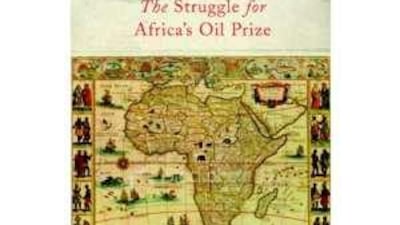Oil has long greased the wheels of change, for good and ill, in Africa. But being home to one of the world's most sought-after commodities has not made it easy for even the most resource-rich nations in the continent to gain economic self-determination. In Crude Continent: The Struggle for Africa's Oil Prize, author Duncan Clarke takes on the tale of the great global oil game, as played in Africa. The book aims to explore in depth the continent's economic, cultural and historical mosaic - its entrenched economic "medievalism" and tribal loyalties - in the context of how it has developed its natural resources.
But in trying to offer a more complex tale, Mr Clarke sometimes gets too bogged down in the detail. Crude Continent's 674 pages encompass regional politics, development economics, corporate and government strategies, and their interaction with international diplomacy. He presents an astute insider's view of the complexities of a critical but poorly understood industry in a region that, literally and figuratively, remains "the dark continent". This does not make easy reading.
Still, Mr Clarke ably raises the bar from other, more oversimplified thinking on the subject, which has led to, he believes, divisive and ill-informed political debate and a plethora of flawed prescriptions for "fixing" Africa that are doomed to fail, especially if imposed from outside. As much as it is a book about oil, Crude Continent is also an African's book about Africa. Born in Zimbabwe, raised near South Africa's border with Mozambique and a visitor to many of the continent's countries in the course of a 30-year career as an energy consultant, Mr Clarke has met, worked with and sometimes befriended many key figures in Africa's corporate and state oil sectors. Yet any reader hoping for instant elucidation of Africa's condition is going to be disappointed. The book contains a wealth of fascinating detail, but few guidelines for connecting the dots.
Indeed, spoon-feeding generalisations to the reader runs contrary to Mr Clarke's purpose, as he makes clear in the book's first 82 pages, devoted to setting forth his founding thesis that Africa's geographic, cultural and historical landscape is vastly more complex than most outsiders presume, and that oil development must be understood in that context. Crude Continent laboriously begins its epic journey with an exhaustive tour of Africa's emerging energy development landscape - from the Opec giants of Nigeria and Angola, to savvy North African regimes and emerging oil states such as Sudan and Ghana, to an array of aspiring entrants to the oil game with good prospects but few discoveries.
This is topped off by a revealing whistle-stop excursion to the few African nations with no apparent oil or gas endowment. To follow, Mr Clarke presents an equally detailed comparative study of corporate strategy, both for domestic and foreign state-controlled oil companies and for their private-sector counterparts, including lesser-known players. Small and mid-sized companies are also active and Africa's oil exploration and development game, and their contributions and strategies, are exhaustively examined.
Despite the book's length, the pace is often hectic, with changing scenery flashing past at confusing speed and omnipresent acronyms merging into alphabet soup. (The contents table contains an appendix of "selected abbreviations".) Crude Continent will fascinate anyone with even a passing interest in African economies or global energy issues. It also drives home Mr Clarke's key point about African heterogeneity.
A final section of the book debunks the "oil curse" theory of African development, popular among well-meaning western interventionists. Mr Clarke also examines whether Africa's oil bounty could save the continent from economic collapse. He concludes that it may be Africa's best hope, but that realising such an outcome would be a "Herculean task" that must be undertaken by Africans themselves. Here, Mr Clarke at last draws with broad strokes on his canvas. But there are many regional and sectoral patterns that seem to emerge from the previous detailed discussions on which he never expounds.
I will touch on only one, with which I dare say the author may take issue: the apparent emergence of oil "addiction" among West African "big man" rulers and their cadres who increasingly depend on oil revenues to support extravagant lifestyles. This trend has been noted by others, and could explain why most western non-governmental organisations (NGOs) blame corporate oil, not venal governments, for oil's failure to alleviate African poverty. Mr Clarke wonders at this without attempting an explanation. But in the context of a popular analogy with addiction, it is clear that NGOs and their supporters see upstream oil companies in the role of drug traffickers, pushers and enablers.
Oil exploitation, unlike drug-running, is neither illegal nor, in most cases, extensively connected to organised crime. But that does not make the analogy less potent in the popular imagination, and it makes the public relations campaigns that NGOs wage with oil companies in Africa instantly understandable. It is Mr Clarke's failure to give due consideration to the root causes of such attitudes that may be the biggest weakness of his latest book.
Crude Continent is nonetheless a monumental achievement, providing unique insight into what is the world's premier oil-exploration arena. It will not be the last word on the subject of African oil. One would hope it will not be the last from this particular knowledgeable and erudite author. @Email:tcarlisle@thenational.ae

